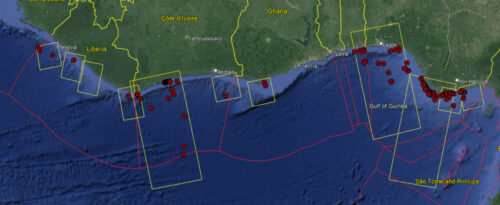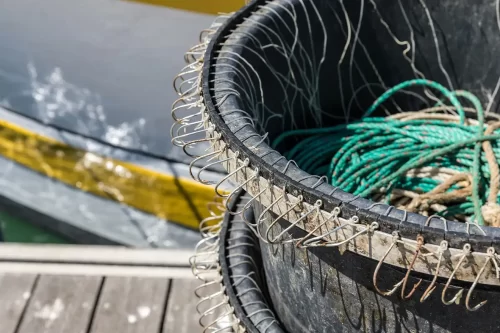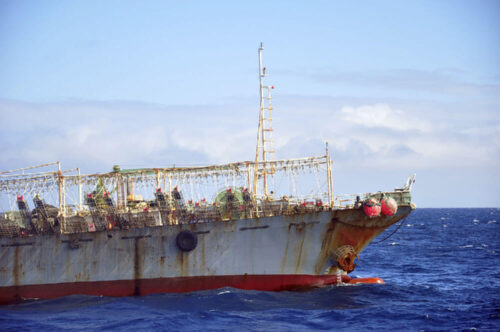Two months ago, the death of fisheries observer Eritara Aati Kaierua was reported in Pacific waters, leading to an ongoing murder investigation. For many people, the idea of a murder taking place on board a confined fishing vessel out at sea seems inconceivable, but for those that know the fisheries sector well, it is yet another harrowing example of shocking abuses that can occur unseen, far from shore. Globally, at least one observer has died or gone missing every year since records began in 2015.

Significant international efforts are rightly focused on the conservation and sustainable use of the oceans and marine resources in line with Sustainable Development Goal (SDG) 14. These sustainable management measures will ultimately be implemented and overseen by fishers and fisheries observers. Ensuring they are provided with safe and decent working conditions should therefore be prioritized in accordance with SDG 8; Decent Work and Economic Growth.
We spoke with Bubba Cook, WWF’s Western and Central Pacific Tuna Program Manager and long-time advocate for human rights and labor justice in the Pacific, about these issues, recent advances in the right direction and what needs to happen to achieve SDGs 8 and 14.
Q: Fishing is widely known as one of the most dangerous professions in the world – unfortunately injuries, exploitation and fatalities still occur. Why does this continue to be the case in 2020?
Life at sea is inherently dangerous. As has been said, “the sea is a harsh mistress” where weather and sea state conditions can change rapidly, putting anyone caught out in them at extreme risk. Throw in sharp knives, hooks, long hours of strenuous labor, extreme temperatures, and often cramped living quarters and you create the perfect storm for injuries at sea. Threats from exposure, injuries, infection, fires, falling overboard, and even sinking are omnipresent on any vessel, but especially fishing vessels. Thus, it’s no surprise that injuries and even fatalities occur at sea as a result of accidents. What should be more concerning is the seemingly increasing occurrence and prevalence of intentional injuries in the form of direct exploitation and abuse of crew as well as homicide. This happens because the sea keeps her secrets, particularly when the general perspective is that when there is no body, there is no crime. Even with all the technology and tools that we have to monitor things in 2020, fishing vessels operate far from shore and away from the prying eyes of oversight, so they feel like they can – and often do – get away with anything…including murder of fisheries observers and crew.
Q: How does a lack of governance enable bad actors who put financial profit above human rights and sustainability to exploit the system?
Governance is only as good as the monitoring and enforcement that ensures those subject to rules are following them. Various international and national legal and regulatory standards exist to protect workers from exploitation and abuse, but if those laws and rules are not applied, monitored, and strongly enforced then businesses – fishing or otherwise – will not follow them. Rules without substantive enforcement are just suggestions and if your profitability is going to be reduced by following them, then there is a very low likelihood that you will follow those suggestions. A good analogy for rules as they apply to fishing on the high seas is a stop sign at an intersection in the middle of the night. If you are a driver that approaches that intersection, especially in a district where you know the police are busy doing other things or simply not around, you might just blow right past that sign. But if you know someone might be watching, whether a police car parked near the intersection or a camera posted on a streetlight, you are more likely to slow down and stop, especially if you know that it could cost you time and money if you don’t. At the end of the day, the issue boils down to simple greed. The risk of clubbing and throwing a fishery observer overboard and not getting caught could be far less than the thousands of dollars it could cost the vessel and owner if the observer reports illegal activity. It’s even more disturbing with respect to crew, who are paid as little as USD10 per day to do back-breaking work as much as 20 hours per day for months at a stretch, on board longline fishing vessels. In short, human life and welfare is exceedingly cheap at sea. Until something is done to better monitor and address human and labor rights at sea, it will remain that way.
Q: How are human rights and sustainability linked in the fisheries sector?
There is a direct correlation between human rights and conservation in two different ways. First, a vessel, company, or captain willing to disregard the rules and put human lives at risk or otherwise exploit them is not going to be likely to follow rules pertaining to the fish they are targeting or the bycatch that results. If you are willing to break laws with respect to human welfare, you’re certainly not going to follow laws with respect to a resource you are making money off of. Second, if crew members are treated like animals, how can we expect them to treat the resource they are charged with exploiting with any respect? In some cases, crew are poorly educated and frequently physically, mentally, and verbally abused. Additionally, they are often overworked and underfed, offered only rice mixed with leftover bait as sustenance. So, it’s easy to imagine that a crew member would club an endangered shark on a line as much out of anger and frustration as to protect their own safety. It’s also easy to imagine a crew member under oppressive conditions and effectively starving to view an endangered albatross or sea turtle as a generous meal regardless of the rules. So, if you secure the level of transparency on those vessels necessary to secure the health and welfare of the crew members, not to mention the safety and security of the fisheries observer, you will simultaneously improve the situation for conservation of the resource as well.
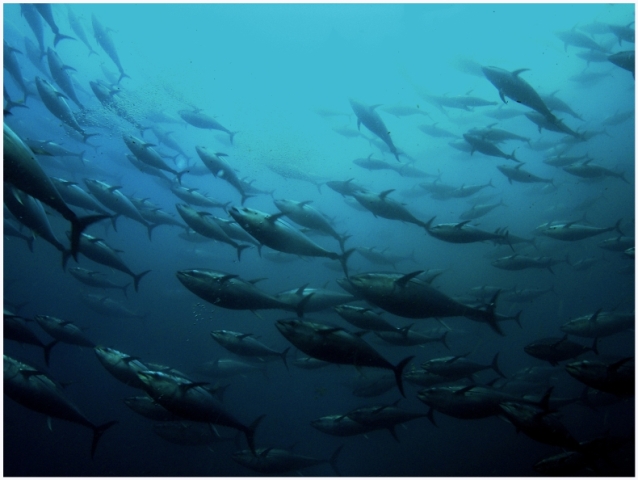
Q: What impacts do these issues have on Pacific communities and what measures have been taken to address the impacts?
The most immediate impact these issues have is directly on those crew members that are sourced from Pacific communities to work on fishing vessels. Some companies have made express commitments for local hire and ensuring the safety and welfare of crew. Second, poorly treated and paid crew serve effectively as a subsidy for those fleets that rely on them. This gives them an unfair economic advantage over those companies and vessels that pay their crew a fair wage and treat them well. Little has been done to address wage disparities among fleets, yet there is broad recognition that labor abuse bordering on human slavery is pervasive throughout the fishing industry. Third, when vessels and crew fail to follow the rules and harvest too much of the resource or, for instance, catch and fin sharks, they are effectively robbing the Pacific communities of their food and economic security as well as their cultural identity in many cases. Pacific communities have tried to address these impacts by imposing transshipment restrictions and port state measures through the regional regulatory process, but those measures have been resisted by distant water fleets that object to better oversight that would detect these kinds of illegal and immoral activities. Thus, much more needs to be done to address this as a matter of social and economic justice for the Pacific communities.
Q: Fisheries observations and inspections are vital to achieving sustainable fisheries, and yet evidence shows observer safety cannot currently be guaranteed. How can advances in technology support their work, their safety and fisheries sustainability?
In 2017, the Western and Central Pacific Fisheries Commission (WCPFC) formalized and codified a comprehensive set of measures designed to address observer safety and security in the region’s tuna fisheries, which included establishing emergency action plans as well as requiring two way communication devices and emergency locator beacons. Other regional fisheries management organisations (RFMOs) such as the Inter American Tropical Tuna Commission (IATTC) followed suit with their own measures. However, these measures were clearly not enough as evidenced by the recent death of Eritara Keiaru Aati, a fisheries observer from Kiribati serving on the Taiwanese flagged purse seiner F/V Win Far 636, whose death in early March 2020 is being investigated as a homicide. Technology can go a long way to address the isolation and challenges that fisheries observers face on fishing vessels, where they are considered at best a nuisance and at worst a threat because of their ability to affect the bottom line of the vessel. Unfortunately, it takes more than technology to ensure that those who might threaten, intimidate, assault, or even kill an observer follow the law. This means there needs to be both transparency of all operations of the vessel and concrete accountability when a vessel and crew violate the law. Of the 13 observers that have died in the line of duty over the last decade, many under suspicious circumstances or evidence of homicide, nobody has ever been convicted or otherwise held responsible for those deaths.
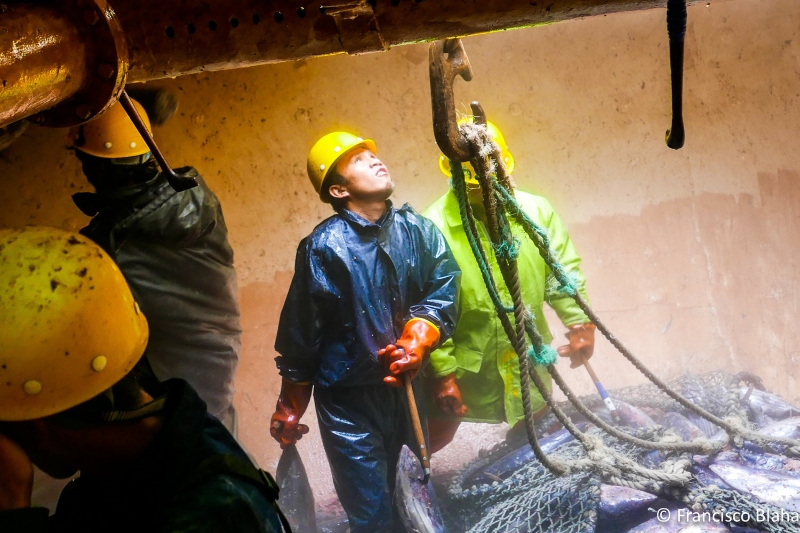
Q: How can information sharing and transparency help to ensure decent work for all?
“Sunlight is the best disinfectant.” Information sharing and transparency unquestionably support the visibility that allows authorities to identify abuse or crimes and address them. Additionally, as we begin to understand what companies, vessels, and individuals are associated with human rights abuses and other crimes, we can enlist markets to use their purchasing power to reward those companies that don’t engage in those practices and exclude and punish those that do. The level of information necessary to do this can’t come soon enough, both to secure justice in the deaths of fisheries observers as well as to secure a dignified and justly compensated profession for fishing crew.
Globally, human rights issues associated with fishing often seem remote and unimaginable. It is difficult for someone buying seafood in their local supermarket to comprehend that it could actually be a product of grotesque human rights abuses. Heartbreakingly, these issues are not hard to imagine for many in the Pacific – the region has extensive experience with loss of life and abuses in the fishing sector which deeply impact communities. This is why the region is taking steps to address human rights hand in hand with sustainability, aiming to responsibly use the ocean and marine resources and ensure decent work for all.
Although not the only answer, fisheries transparency will minimize opportunities for the exploitation of both marine resources and people to take place out of sight and highlight potential risk for further investigation. Stakeholders can prioritize information sharing and collaboration to ensure the safe and decent working conditions fishers and observers are entitled to as well as the sustainable use of life below water.
